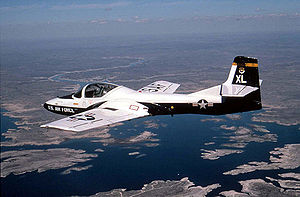
The Cessna T-37 Tweet (designated Model 318 by Cessna) is a small, economical twin-engined jet trainer-attack type aircraft which flew for decades as a primary trainer for the United States Air Force (USAF) and in the air forces of several other nations. The A-37 Dragonfly variant served in the light attack role during the Vietnam War and continues to serve in the air forces of several South American nations.
The T-37 served as the U.S. Air Force's primary pilot training vehicle for over 52 years after its first flight. After completing Primary in the Tweet, students moved on to other advanced Air Force, Navy, Marine Corps or Allied trainers. With a total of 1,269 Cessna T-37s built, the USAF retired its last T-37 in 2009.
The Cessna Aircraft Company of Wichita, Kansas provided the United States Army during World War II and the Korean War with utility, light transport, and observation aircraft, particularly the "O-1 Bird Dog" series.
In the spring of 1952, the United States Air Force (USAF) issued a request for proposals for a "Trainer Experimental (TX)" program, specifying a lightweight two-seat basic trainer for introducing USAF cadets to jet aircraft.